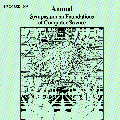We introduce a new notion of information complexity for multi-pass streaming problems and use it to resolve several important questions in data streams. In the coin problem, one sees a stream of $n$ i.i.d. uniform bits and one would like to compute the majority with constant advantage. We show that any constant pass algorithm must use $\Omega(\log n)$ bits of memory, significantly extending an earlier $\Omega(\log n)$ bit lower bound for single-pass algorithms of Braverman-Garg-Woodruff (FOCS, 2020). This also gives the first $\Omega(\log n)$ bit lower bound for the problem of approximating a counter up to a constant factor in worst-case turnstile streams for more than one pass. In the needle problem, one either sees a stream of $n$ i.i.d. uniform samples from a domain $[t]$, or there is a randomly chosen needle $\alpha \in[t]$ for which each item independently is chosen to equal $\alpha$ with probability $p$, and is otherwise uniformly random in $[t]$. The problem of distinguishing these two cases is central to understanding the space complexity of the frequency moment estimation problem in random order streams. We show tight multi-pass space bounds for this problem for every $p < 1/\sqrt{n \log^3 n}$, resolving an open question of Lovett and Zhang (FOCS, 2023); even for $1$-pass our bounds are new. To show optimality, we improve both lower and upper bounds from existing results. Our information complexity framework significantly extends the toolkit for proving multi-pass streaming lower bounds, and we give a wide number of additional streaming applications of our lower bound techniques, including multi-pass lower bounds for $\ell_p$-norm estimation, $\ell_p$-point query and heavy hitters, and compressed sensing problems.
翻译:暂无翻译




